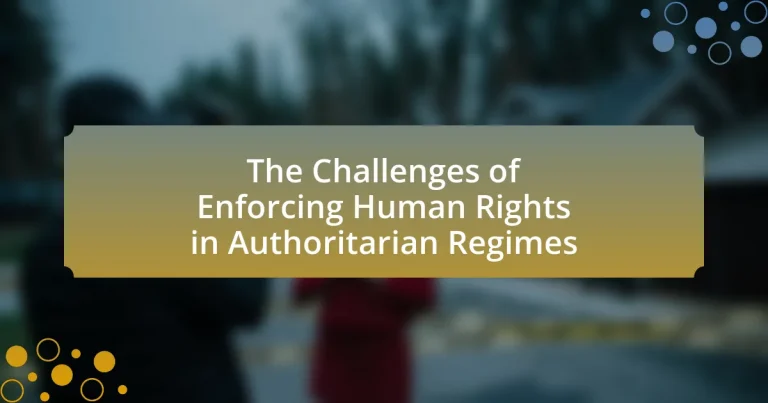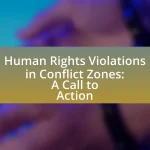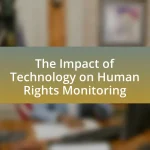The article examines the challenges of enforcing human rights in authoritarian regimes, highlighting issues such as the lack of political will, suppression of dissent, and limited access to independent judicial systems. It details how these regimes systematically violate rights through repression, censorship, and state violence, often manipulating legal frameworks to justify abuses. The article also discusses the role of international organizations, local activists, and the impact of surveillance on human rights enforcement, while outlining strategies for promoting human rights, including grassroots activism and international pressure. Key human rights infringements, methods of dissent suppression, and the implications of government policies are also analyzed, providing a comprehensive overview of the complexities involved in advocating for human rights in oppressive environments.
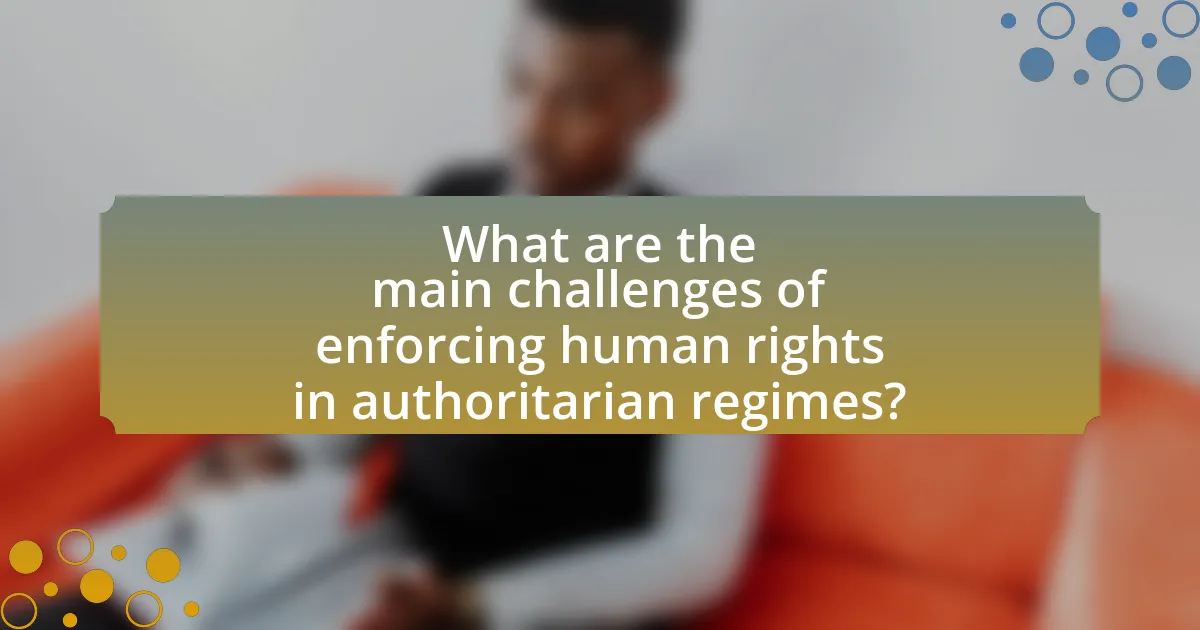
What are the main challenges of enforcing human rights in authoritarian regimes?
The main challenges of enforcing human rights in authoritarian regimes include the lack of political will, suppression of dissent, and limited access to independent judicial systems. Authoritarian governments often prioritize state security over individual rights, leading to systematic violations. For instance, according to the Freedom House report, many authoritarian states employ censorship and surveillance to stifle opposition, making it difficult for human rights organizations to operate effectively. Additionally, the absence of an independent judiciary means that legal recourse for victims of human rights abuses is often unavailable, further entrenching the regime’s power and impunity.
How do authoritarian regimes typically violate human rights?
Authoritarian regimes typically violate human rights through systematic repression, censorship, and the use of state violence. These regimes often suppress freedom of speech and assembly, leading to the persecution of dissenters and activists. For instance, according to the Freedom House report, countries like North Korea and Belarus employ tactics such as arbitrary detention, torture, and extrajudicial killings to maintain control and silence opposition. Additionally, authoritarian governments frequently manipulate legal systems to justify human rights abuses, undermining the rule of law and denying individuals their basic rights.
What specific human rights are most commonly infringed upon?
The specific human rights most commonly infringed upon include the right to freedom of expression, the right to a fair trial, and the right to freedom from torture. In authoritarian regimes, these rights are frequently violated through censorship, arbitrary detention, and the use of torture to suppress dissent. For instance, according to the 2022 Freedom in the World report by Freedom House, many countries with authoritarian governments systematically restrict free speech and assembly, leading to widespread human rights abuses.
How do government policies contribute to human rights violations?
Government policies contribute to human rights violations by establishing legal frameworks that enable repression and discrimination. For instance, laws that restrict freedom of speech, assembly, and the press often lead to the persecution of dissenters and marginalized groups. In authoritarian regimes, policies may include surveillance measures, arbitrary detention, and torture, which are justified under the guise of national security or public order. Historical examples include the use of the Patriot Act in the United States post-9/11, which expanded government surveillance capabilities and led to civil liberties infringements. Additionally, policies that prioritize state security over individual rights can result in systemic abuses, as seen in countries like North Korea, where the government enforces strict control over its citizens, leading to widespread human rights violations.
Why is it difficult for international organizations to intervene?
International organizations face significant challenges in intervening due to issues of state sovereignty, political will, and resource limitations. State sovereignty often prevents external entities from acting without the consent of the government in question, as seen in cases like Syria, where the Assad regime has resisted foreign intervention. Additionally, political will among member states can be lacking, as countries may prioritize national interests over collective action, leading to inaction in crises. Resource limitations further complicate intervention efforts, as organizations like the United Nations often operate with constrained budgets and personnel, hindering their ability to respond effectively to human rights violations in authoritarian regimes.
What legal frameworks exist for international intervention?
Legal frameworks for international intervention primarily include the United Nations Charter, particularly Articles 2(4) and 51, which outline the principles of state sovereignty and the right to self-defense. The Responsibility to Protect (R2P) doctrine further establishes that the international community has an obligation to intervene in cases of genocide, war crimes, ethnic cleansing, and crimes against humanity when a state fails to protect its population. Additionally, regional agreements, such as the African Union’s Constitutive Act, provide mechanisms for intervention in member states facing severe human rights violations. These frameworks are supported by various international treaties and customary international law, which collectively guide the legitimacy and scope of intervention actions.
How do political relationships affect intervention efforts?
Political relationships significantly influence intervention efforts by determining the level of cooperation or resistance among states. For instance, countries with strong diplomatic ties may collaborate on humanitarian interventions, as seen in the coordinated response to the 2011 Libyan crisis, where NATO allies worked together to enforce a no-fly zone. Conversely, strained political relationships can hinder intervention, as demonstrated by the lack of action in Syria due to geopolitical rivalries, where competing interests among nations like Russia and the United States have obstructed unified efforts to address human rights violations. Thus, the nature of political relationships directly impacts the feasibility and effectiveness of intervention strategies in authoritarian regimes.
What role do local activists play in advocating for human rights?
Local activists play a crucial role in advocating for human rights by mobilizing communities, raising awareness, and holding authorities accountable. They often serve as the first line of defense against human rights abuses, utilizing grassroots organizing to educate the public about their rights and the importance of social justice. For instance, in authoritarian regimes, local activists frequently document violations and share information through social media and independent reporting, which can lead to international pressure on governments. Their efforts have been instrumental in movements such as the Arab Spring, where local activists organized protests and highlighted state repression, ultimately influencing global discourse on human rights.
How do activists operate under oppressive conditions?
Activists operate under oppressive conditions by employing strategies such as clandestine organizing, digital security measures, and building coalitions with local and international allies. Clandestine organizing allows activists to plan actions without detection, often using encrypted communication tools to protect their identities and strategies. Digital security measures, including the use of VPNs and secure messaging apps, help activists safeguard their communications from surveillance. Additionally, forming coalitions with local communities and international organizations enhances their visibility and support, as seen in movements like the Arab Spring, where activists utilized social media to mobilize and gain global attention despite oppressive regimes. These methods demonstrate how activists adapt to and navigate the challenges posed by authoritarian environments.
What risks do activists face in authoritarian regimes?
Activists in authoritarian regimes face significant risks, including imprisonment, torture, and extrajudicial killings. These regimes often employ repressive measures to silence dissent, leading to the arrest of activists for their political beliefs or actions. For instance, according to Amnesty International, in countries like Belarus and Iran, activists have been subjected to severe human rights violations, including arbitrary detention and physical abuse. Additionally, surveillance and harassment are common tactics used to intimidate activists, further endangering their safety and freedom.
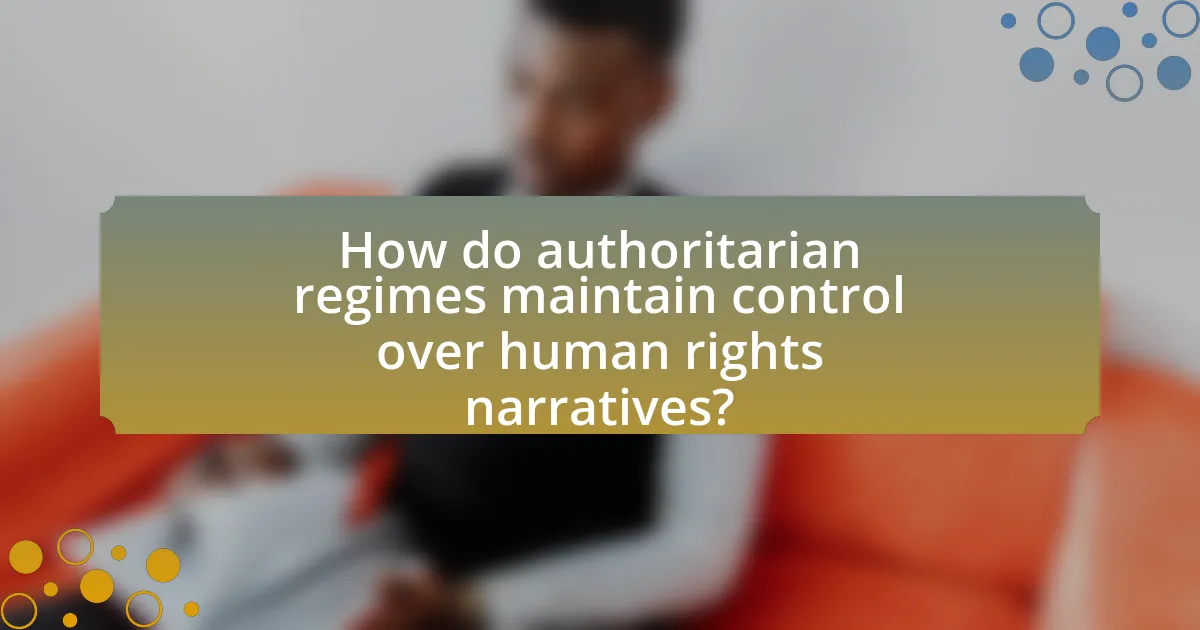
How do authoritarian regimes maintain control over human rights narratives?
Authoritarian regimes maintain control over human rights narratives through censorship, propaganda, and repression of dissent. These regimes often employ state-controlled media to shape public perception, disseminating information that aligns with their interests while suppressing opposing viewpoints. For instance, in countries like China, the government utilizes the Great Firewall to restrict access to foreign news and social media platforms, effectively controlling the narrative surrounding human rights issues. Additionally, authoritarian governments may employ legal mechanisms to silence activists and journalists, as seen in Russia, where laws against “foreign agents” target organizations that criticize the state. This combination of media manipulation and legal repression enables these regimes to create a dominant narrative that minimizes human rights abuses and portrays the government as a protector of stability and order.
What methods do regimes use to suppress dissenting voices?
Regimes use various methods to suppress dissenting voices, including censorship, surveillance, intimidation, and imprisonment. Censorship involves controlling or restricting access to information, often through media regulations or internet restrictions, as seen in countries like China, where the Great Firewall limits online discourse. Surveillance is employed to monitor citizens’ activities and communications, creating an atmosphere of fear; for instance, the use of facial recognition technology in authoritarian states allows for tracking dissenters. Intimidation tactics, such as harassment or threats against activists and their families, further discourage opposition. Imprisonment of political dissidents is a common practice, exemplified by the jailing of opposition leaders in countries like Belarus, where dissent is met with severe legal repercussions. These methods collectively undermine free expression and human rights, reinforcing the power of authoritarian regimes.
How does censorship impact the dissemination of human rights information?
Censorship significantly hinders the dissemination of human rights information by restricting access to critical data and narratives. In authoritarian regimes, governments often employ censorship to suppress dissent and control public perception, which directly limits the ability of individuals and organizations to share information about human rights abuses. For instance, according to a report by Freedom House, countries with high levels of censorship, such as North Korea and China, experience severe limitations on media freedom, which correlates with widespread human rights violations. This suppression not only prevents the public from being informed but also stifles advocacy efforts aimed at promoting human rights, thereby perpetuating a cycle of abuse and ignorance.
What role does propaganda play in shaping public perception?
Propaganda plays a crucial role in shaping public perception by influencing beliefs, attitudes, and behaviors through the dissemination of biased or misleading information. In authoritarian regimes, propaganda is often utilized to control narratives, suppress dissent, and maintain power by framing issues in a way that aligns with the regime’s interests. For instance, during the Soviet Union’s existence, state-controlled media portrayed the government as a benevolent force, while dissenters were depicted as threats to national security, effectively manipulating public perception to sustain the regime’s authority. This strategic use of propaganda not only distorts reality but also creates a climate of fear and conformity, making it challenging for individuals to critically assess information and advocate for human rights.
How do regimes manipulate legal systems to undermine human rights?
Regimes manipulate legal systems to undermine human rights by enacting laws that restrict freedoms and by using judicial processes to target dissenters. For instance, authoritarian governments often implement vague laws that criminalize peaceful assembly or speech, allowing for arbitrary arrests and detentions. A notable example is the use of anti-terrorism laws in countries like Egypt, where such legislation has been employed to suppress political opposition and silence activists. Additionally, regimes may exert influence over the judiciary, ensuring that courts serve the interests of the state rather than uphold justice, as seen in Russia, where the legal system is frequently used to prosecute political opponents under fabricated charges. This manipulation of legal frameworks effectively erodes protections for human rights and fosters an environment of fear and repression.
What are the implications of using law as a tool of oppression?
Using law as a tool of oppression leads to the systematic violation of human rights and the entrenchment of authoritarian power. Authoritarian regimes often manipulate legal frameworks to suppress dissent, control the population, and maintain their grip on power. For instance, laws may be enacted to criminalize free speech, assembly, and other fundamental rights, effectively silencing opposition and instilling fear among citizens. Historical examples include the use of anti-terrorism laws in countries like Egypt and Turkey, where such legislation has been employed to justify the arrest and persecution of political opponents and activists. This manipulation of law not only undermines justice but also erodes public trust in legal institutions, creating a cycle of oppression that is difficult to dismantle.
How do judicial processes differ in authoritarian contexts?
Judicial processes in authoritarian contexts are characterized by a lack of independence and transparency compared to democratic systems. In authoritarian regimes, courts often serve as instruments of the state, prioritizing the interests of the ruling party over justice. For instance, judges may be appointed based on loyalty to the regime rather than legal expertise, leading to biased rulings that suppress dissent and protect government officials. Additionally, legal proceedings may lack due process, with arbitrary detentions and limited access to legal representation being common. Historical examples include the use of show trials in the Soviet Union, where the outcomes were predetermined to reinforce state power. These factors contribute to a judicial environment that undermines human rights and fails to uphold the rule of law.
What impact does surveillance have on human rights enforcement?
Surveillance significantly undermines human rights enforcement by creating an environment of fear and repression. In authoritarian regimes, extensive surveillance systems monitor citizens, deterring them from exercising their rights to free speech, assembly, and privacy. For instance, the 2019 report by Human Rights Watch highlighted that in countries like China, the use of advanced surveillance technologies has led to the suppression of dissent and the targeting of ethnic minorities, thereby violating fundamental human rights. This pervasive monitoring not only restricts individual freedoms but also hampers civil society’s ability to advocate for human rights, as activists face increased risks of persecution and imprisonment.
How does technology facilitate state surveillance?
Technology facilitates state surveillance by enabling the collection, analysis, and storage of vast amounts of data on individuals. Surveillance technologies such as facial recognition systems, internet monitoring tools, and mobile tracking applications allow governments to monitor citizens’ activities in real-time. For instance, countries like China utilize advanced facial recognition technology to track individuals in public spaces, with reports indicating that the government has installed millions of surveillance cameras across urban areas. Additionally, data mining techniques enable the analysis of social media interactions, which can reveal personal information and associations, further enhancing state surveillance capabilities. These technologies create an environment where privacy is significantly compromised, allowing authoritarian regimes to maintain control and suppress dissent.
What are the consequences of surveillance on civil liberties?
Surveillance significantly undermines civil liberties by eroding privacy, stifling free expression, and fostering a culture of fear. When governments monitor individuals’ communications and activities, it creates an environment where people may self-censor due to the fear of repercussions for their thoughts or actions. Historical examples, such as the Stasi in East Germany, illustrate how pervasive surveillance can lead to widespread distrust among citizens and a chilling effect on dissent. Additionally, studies indicate that increased surveillance correlates with a decline in public participation and activism, as individuals become wary of expressing their opinions or engaging in protests. Thus, the consequences of surveillance on civil liberties are profound, leading to diminished freedoms and a less open society.
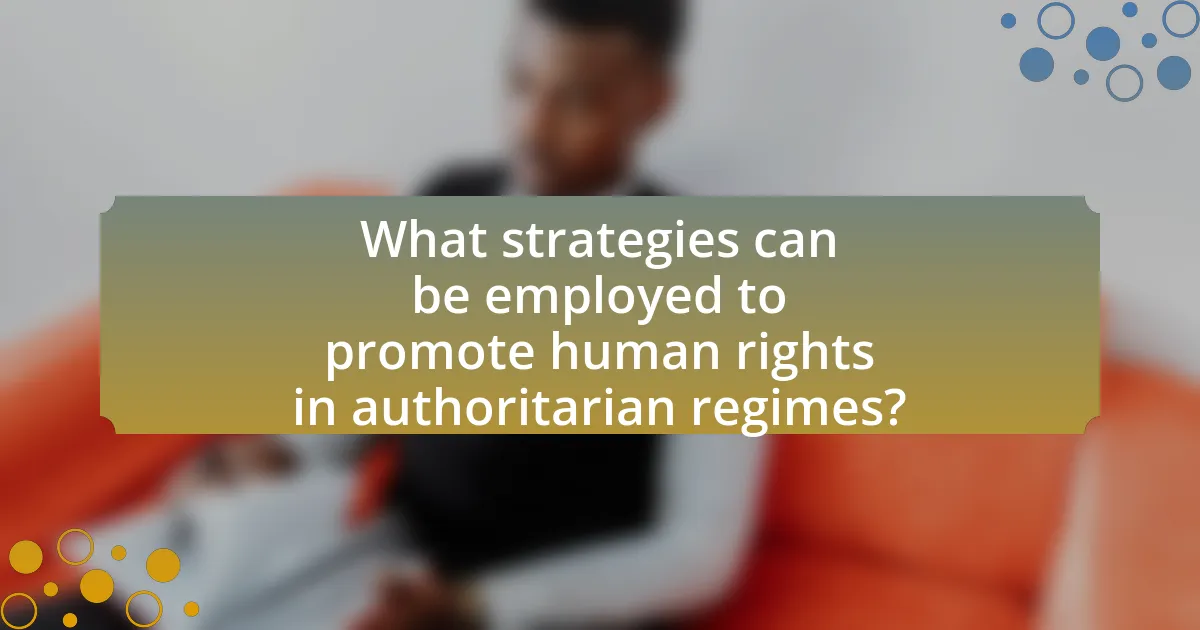
What strategies can be employed to promote human rights in authoritarian regimes?
Strategies to promote human rights in authoritarian regimes include international pressure, grassroots activism, and leveraging technology for advocacy. International pressure can manifest through sanctions, diplomatic isolation, and public condemnation, which have historically led to changes in policies, as seen in the case of South Africa during apartheid. Grassroots activism empowers local populations to demand rights and accountability, exemplified by movements like the Arab Spring, which mobilized citizens against oppressive governments. Additionally, technology facilitates the documentation of human rights abuses and the dissemination of information, as demonstrated by social media’s role in raising awareness during protests in Iran and Belarus. These strategies collectively create an environment that can challenge authoritarian practices and promote human rights.
How can international pressure be effectively applied?
International pressure can be effectively applied through coordinated diplomatic efforts, economic sanctions, and public advocacy campaigns. Coordinated diplomatic efforts involve multiple countries or international organizations working together to address human rights violations, as seen in the United Nations’ resolutions that condemn actions of authoritarian regimes. Economic sanctions, such as those imposed on North Korea and Iran, can target specific individuals or sectors to compel compliance with international norms. Public advocacy campaigns leverage media and civil society to raise awareness and mobilize global opinion against human rights abuses, exemplified by movements like #MeToo and #BlackLivesMatter, which have influenced policy changes. These methods collectively create a multifaceted approach that can lead to tangible changes in the behavior of authoritarian regimes.
What role do sanctions play in influencing authoritarian regimes?
Sanctions serve as a critical tool for influencing authoritarian regimes by exerting economic and political pressure to alter their behavior. These measures can lead to significant economic hardship, which may compel authoritarian leaders to reconsider their policies, particularly regarding human rights violations. For instance, the imposition of sanctions on North Korea has aimed to curb its nuclear ambitions and human rights abuses, demonstrating how economic isolation can impact regime stability and decision-making. Additionally, targeted sanctions against specific individuals within a regime can undermine their power and create internal dissent, as seen in the case of Venezuela, where sanctions have contributed to political instability and public unrest.
How can diplomatic efforts be structured to support human rights?
Diplomatic efforts can be structured to support human rights by prioritizing dialogue, leveraging economic incentives, and fostering international coalitions. Engaging in constructive dialogue with authoritarian regimes can create pathways for reform, as seen in the case of the United Nations’ Universal Periodic Review, which encourages countries to improve their human rights records through peer pressure and recommendations. Economic incentives, such as conditional trade agreements or sanctions, can compel governments to adhere to human rights standards; for instance, the European Union has utilized trade agreements to promote human rights compliance in countries like Myanmar. Additionally, forming coalitions with like-minded nations amplifies the pressure on authoritarian regimes, as demonstrated by the Global Magnitsky Act, which allows countries to impose sanctions on individuals involved in human rights abuses. These structured diplomatic approaches can effectively promote and protect human rights in challenging environments.
What grassroots movements have successfully challenged authoritarianism?
Grassroots movements that have successfully challenged authoritarianism include the Solidarity movement in Poland, the Civil Rights Movement in the United States, and the Arab Spring protests across various Middle Eastern countries. The Solidarity movement, led by Lech Wałęsa in the 1980s, played a crucial role in undermining communist rule in Poland, leading to the eventual fall of the regime in 1989. The Civil Rights Movement, particularly from the 1950s to the 1960s, effectively challenged systemic racial oppression and led to significant legislative changes, including the Civil Rights Act of 1964. The Arab Spring, which began in 2010, saw mass protests in countries like Tunisia and Egypt, resulting in the ousting of long-standing authoritarian leaders, such as Zine El Abidine Ben Ali and Hosni Mubarak. These movements demonstrate the power of collective action in confronting and dismantling authoritarian regimes.
What lessons can be learned from successful human rights campaigns?
Successful human rights campaigns demonstrate the importance of grassroots mobilization and coalition-building. These campaigns often succeed by engaging diverse groups, including local communities, NGOs, and international organizations, which amplifies their reach and impact. For instance, the anti-apartheid movement in South Africa effectively united various factions, leading to significant political change and the eventual dismantling of apartheid in the early 1990s. Additionally, successful campaigns highlight the necessity of strategic communication, utilizing media to raise awareness and garner public support, as seen in the global response to the Syrian civil war, where social media played a crucial role in mobilizing international advocacy. These examples illustrate that collaboration, effective messaging, and community involvement are vital components for achieving human rights objectives, especially in challenging authoritarian contexts.
How can solidarity among activists enhance their impact?
Solidarity among activists enhances their impact by fostering collaboration, amplifying voices, and increasing resource sharing. When activists unite, they can combine their strengths, leading to more effective campaigns and broader outreach. For instance, during the Arab Spring, various activist groups collaborated across borders, sharing strategies and resources, which significantly increased their collective influence against authoritarian regimes. This unity not only raises awareness but also creates a stronger front that can challenge oppressive systems more effectively.
What practical steps can individuals take to support human rights?
Individuals can support human rights by actively participating in advocacy efforts, such as joining or donating to organizations that promote human rights, like Amnesty International or Human Rights Watch. These organizations work to document abuses and lobby for policy changes, providing a structured way for individuals to contribute to the fight against human rights violations. Additionally, individuals can raise awareness by sharing information on social media, attending protests, or engaging in community discussions about human rights issues. Research indicates that grassroots movements can significantly influence public policy and awareness, as seen in the global response to the Black Lives Matter movement, which has led to legislative changes in various countries.
How can awareness and education contribute to human rights advocacy?
Awareness and education are crucial for human rights advocacy as they empower individuals with knowledge about their rights and the mechanisms available for protection. Educated individuals are more likely to recognize violations and mobilize for change, as evidenced by the role of educational programs in increasing public understanding of human rights issues, which has been shown to lead to greater civic engagement and advocacy efforts. For instance, the United Nations Educational, Scientific and Cultural Organization (UNESCO) emphasizes that human rights education fosters respect for diversity and promotes social justice, thereby enhancing advocacy efforts against authoritarian regimes.
What resources are available for those looking to get involved?
Resources available for those looking to get involved in enforcing human rights in authoritarian regimes include non-governmental organizations (NGOs) such as Amnesty International and Human Rights Watch, which provide training, advocacy tools, and platforms for activism. These organizations publish reports and guidelines that detail human rights violations and offer ways for individuals to participate in campaigns, petitions, and awareness-raising activities. Additionally, online platforms like Change.org enable individuals to create and support petitions aimed at influencing policy changes. Academic institutions often host workshops and seminars that focus on human rights issues, providing further educational resources and networking opportunities for activists.
